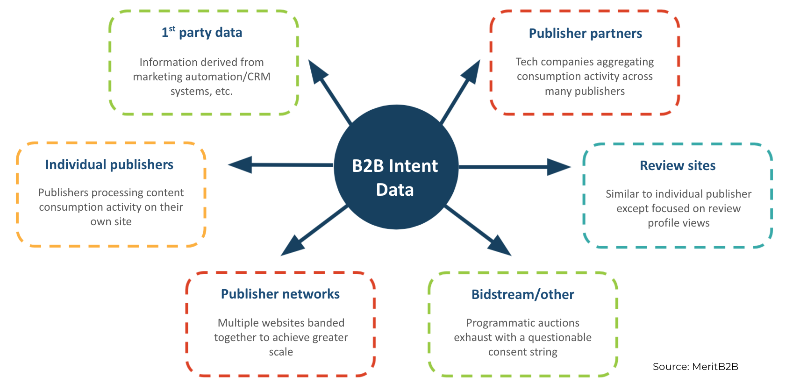Don't settle for half the story
Demyst gives you access to all of the data you need. Evaluate thousands of data attributes from hundreds of possible data connectors all pulled into your own custom-built APIs for instant data deployment.


Following up from our webinar with 180byTwo (a certified data vendor in the Demyst ecosystem), this post will provide a deeper understanding of how B2B intent data is sourced and its application to B2B marketing.
What is intent data?
Intent data provides a measure of interest (it could be a yes/no flag or a score based on the provider) in products, services, and/or general business topics. Topics are virtually unlimited and customizable, but there are some typical ones such as financial expansion, construction, hiring, etc. Intent data is primarily sourced from publisher networks that track individual behavior (based on cookies or IP-addresses) and publisher partners that aggregate data (using cookies) across publisher networks. This data is then mapped to companies using various techniques (e.g., IP-address location). The table below provides an example of raw output on intent data, along with a velocity score, which measures the intensity of research activity for each company and topic. The score is normalized by company size and against news spikes.
| Account Link ID | Topic | Velocity Score | Company Name | Zip |
| 95dddab477 | application server | 80.51 | shell | 10591 |
| f5a3a0b911 | security architecture | 90.35 | hamilton investment and trust | 95948 |
| ff98473b69 | social media strategies summit | 87.13 | century link, centurylink | 19107 |
| 6f40e8a8f0 | workforce planning | 86.5 | pnc bank, pnc bank atm | 19107 |
What is it useful for?
Given the customizability of B2B intent data, there are many potential use-cases, but here are a few:
We conducted an in-depth webinar on these topics which can be accessed here. We also briefly discuss the applicability of intent data to B2C use-cases in the webinar.
Are there any concerns on the horizon?
Yes! Google has indicated that third-party cookies will be phased out of its highly popular Chrome browser by 2022, and replaced by its own proprietary tracking system (see here for an in-depth description). We're still in the early days of understanding how Google's system will impact advertising, but third-party cookies are the primary mechanism of tracking users across the internet and intent data providers have developed a deep pool of cookies to track users. Losing these will dramatically impact intent data providers.
What will be the impact?
Google is not the lone-player in banning third-party cookies. Firefox, Safari, and others have followed suit, but it is the most significant player because Android has 85% of the smartphone market and Chrome has 64% of the browser market. That being said, with every change there is ample room for innovation and intent data providers are keen on staying relevant. As a result, major players in this space such MeritB2B and Bombora are developing proprietary opt-in networks of thousands of targeted content providers. While scale will likely decrease, data quality and compliance will improve in this space.
Don't settle for half the story
Demyst gives you access to all of the data you need. Evaluate thousands of data attributes from hundreds of possible data connectors all pulled into your own custom-built APIs for instant data deployment.

External data can be easy to discover and deploy